
Dental implants, including whole mouth and full mouth dental implants, have revolutionized tooth replacement at 4M Dental Implant Center. These innovative solutions, such as teeth in one day, offer patients a permanent and natural-looking alternative to traditional dentures. Proper maintenance of dental implants is crucial for their longevity and the overall health of the mouth. In this article, we’ll explore essential tips for caring for your dental implants to ensure their durability and your oral well-being.
Key Takeaways
- Proper dental implant maintenance combines diligent home care with regular professional cleanings and examinations
- Specialized oral hygiene tools and techniques are essential for effective dental implant treatment and care
- Avoiding smoking, limiting alcohol, and maintaining a healthy diet support long-term implant success
- Regular dental check-ups allow for early detection and prevention of potential implant complications
- Immediate post-operative care and following dentist instructions are crucial for successful implant healing
1. Use a Soft Nylon Brush

Proper maintenance of dental implants is crucial for their longevity and overall oral health. The first step in an effective 4M Dental Implant Center care routine involves using a soft nylon brush. This gentle tool helps remove plaque and debris without causing damage to the implant or surrounding tissues.
Soft nylon brushes are ideal for implant care as they effectively clean the implant surface and adjacent teeth without irritating the gums. Regular tooth brushing with these brushes helps maintain optimal oral hygiene, preventing the buildup of harmful bacteria that can lead to infections or full mouth dental implants failure.
When brushing dental implants, patients should use gentle, circular motions to clean all surfaces of the implant and surrounding teeth. This technique ensures thorough cleaning while minimizing the risk of damaging the implant components or irritating the gums. Proper brushing also promotes healthy bone integration around the 4M Dental Implant Center:
| Brushing Technique | Benefits |
| Gentle circular motions | Thorough cleaning, minimal irritation |
| Soft nylon bristles | Effective plaque removal, gum protection |
| Regular brushing | Promotes oral hygiene, supports bone health |
Patients should brush their dental implants at least twice daily, paying special attention to the area where the implant meets the gum line. This diligent oral hygiene practice helps maintain a healthy mouth environment, supporting the long-term success of full mouth dental implants and overall oral health.
2. Avoid Abrasive Products

Dental implant patients should exercise caution when selecting oral care products from 4M Dental Implant Center, avoiding abrasive substances that can potentially damage the implant surface or surrounding tissues. Abrasive toothpastes, harsh mouthwashes, and metal cleaning tools can lead to microscopic scratches on the implant, creating areas where bacteria can accumulate and potentially cause infection.
Dentists recommend using non-abrasive, specially formulated toothpastes and alcohol-free mouthwashes for whole mouth dental implants care. These gentle products effectively clean without risking injury to the implant or adjacent gum tissue. Patients who smoke should be particularly vigilant about their oral hygiene routine, as smoking can negatively impact implant healing and long-term success of any dental implant procedure.
Regular dental check-ups at the 4M Dental Implant Center dental offices are essential for monitoring whole mouth dental implants health and addressing any potential issues early. During these visits, dental professionals can assess the condition of the full mouth dental implants and surrounding tissues, providing guidance on proper care techniques and recommending appropriate products. Some dental insurance plans may cover teeth in one day routine check-ups, making it easier for patients to maintain their implants effectively.
By avoiding abrasive products and following professional advice, patients can significantly reduce the risk of implant complications and ensure the longevity of their dental implants. This careful approach to implant maintenance helps preserve both the aesthetic and functional benefits of the treatment, contributing to overall oral health and patient satisfaction.
3. Floss Daily

Daily flossing is a critical component of dental implant maintenance, playing a vital role in preventing implant failure and preserving overall oral health. Regular flossing removes plaque and food particles from areas that brushing alone cannot reach, reducing the risk of infection, bleeding, inflammation, and calculus buildup around the implant. To ensure consistent flossing habits, patients can employ various strategies, such as setting reminders, keeping floss readily available, using floss threaders implementing reward systems, and incorporating flossing into daily routines.
Set a Reminder on Your Phone
Setting a reminder on one’s phone can significantly improve adherence to daily flossing routines for dental implant patients. By utilizing smartphone features or dedicated reminder apps, individuals can receive timely notifications to use dental floss, helping prevent tooth loss and maintain optimal oral hygiene.
These digital reminders serve as effective prompts to complete the entire oral care routine, including using mouthwash and a toothbrush to remove dental plaque. Consistent reminders encourage the formation of healthy habits, ensuring that flossing becomes an integral part of daily dental implant maintenance:
- Choose a convenient time for flossing
- Set a recurring daily reminder
- Use motivational messages in the reminder
- Track flossing streak to build consistency
- Adjust reminder times as needed
Stash Floss in Your Car or Purse
Maintaining proper oral hygiene for dental implants extends beyond the confines of one’s home. Stashing floss in a car or purse ensures patients can address food particles and plaque buildup promptly, reducing the risk of oral health issues like periodontal disease and infection. This practice is particularly beneficial for those with implant-supported prostheses, as it allows for immediate care after meals or throughout the day.
Convenient access to floss promotes consistent oral hygiene habits, which are crucial for preventing complications and maintaining the longevity of dental implants. By keeping floss readily available, patients can perform necessary therapy on-the-go, minimizing the risk of implant failure and preserving overall oral health. This proactive approach to implant care supports the success of the treatment and helps patients maintain their investment in their oral health:
| Location | Benefits |
| Car | Easy access after meals |
| Purse | On-the-go oral care |
| Office desk | Consistent daily hygiene |
Reward Yourself for Flossing
Implementing a reward system for consistent flossing can significantly enhance dental implant maintenance. The American Dental Association recommends daily flossing as a crucial parameter for preventing mucositis and other implant-related complications. Patients who establish a reward structure for their flossing routine often experience improved motivation and adherence to this essential oral care practice.
Dental hygienists often suggest creating personalized rewards that align with individual preferences and goals. These incentives can range from small daily treats to larger monthly rewards for maintaining a consistent flossing streak. For patients with osteoporosis or other bone-related conditions that can lead to loss of bone density, consistent flossing becomes even more critical in preserving implant stability and overall oral health. A well-designed reward system can help reinforce this vital habit:
| Flossing Frequency | Reward Example | Benefit |
| Daily | Small treat or self-care activity | Immediate positive reinforcement |
| Weekly streak | Movie night or favorite meal | Sustained motivation |
| Monthly consistency | Spa day or new gadget | Long-term habit formation |
Do It While You’re Watching TV
Incorporating flossing into one’s television-watching routine can significantly enhance dental implant maintenance. This multitasking approach allows patients to combine a necessary oral hygiene practice with a relaxing activity, making it more likely for them to adhere to their daily flossing regimen. Periodontology experts recommend this method as an effective way to ensure consistent dental implant care without disrupting one’s leisure time.
While engaging in this practice, patients should be mindful of proper flossing techniques to avoid causing pain or damaging their dental restorations. It is essential to maintain good hygiene habits and avoid consuming alcohol during this time, as it can interfere with oral health. By making flossing a part of their TV-watching routine, patients can establish a consistent habit that supports the longevity of their dental implants:
| TV Activity | Flossing Benefit |
| Commercial breaks | Regular intervals for thorough cleaning |
| During slow scenes | Focused attention on proper technique |
| End credits | Consistent daily habit formation |
4. Avoid Sticky/Hard Foods

Dental implant patients must exercise caution when consuming certain foods to protect their implants and maintain oral health. Hard and sticky foods can potentially damage the crown or abutment, leading to costly repairs or replacement. Patients should avoid items such as hard candies, nuts, and chewy caramels that may compromise the integrity of their dental implants.
Consuming sticky foods can also increase the risk of developing periodontal disease around the implant site. These foods tend to adhere to the implant and surrounding tissues, creating an environment conducive to bacterial growth. Patients who have undergone bone grafting procedures should be particularly vigilant about avoiding such foods, as they may interfere with the healing process and implant integration, which can lead to dental implant failure.
While orthodontics and dental implants are separate treatments, patients with both should be mindful of their dietary choices. Hard foods can potentially damage orthodontic appliances and implant components alike. Dentists recommend adopting a softer diet, especially during the initial healing phase following implant placement:
- Avoid hard candies and nuts
- Limit consumption of sticky foods like caramel
- Choose softer alternatives when possible
- Cut harder foods into smaller, manageable pieces
- Be cautious with foods that require excessive chewing
Patients should consult their dental professional for personalized advice on dietary restrictions and modifications. By adhering to these guidelines, individuals can significantly reduce the risk of implant complications and ensure the longevity of their dental restorations. Regular dental check-ups and proper oral hygiene practices complement these dietary precautions in maintaining optimal implant health.
5. Avoid Smoking and Alcohol

Dental implant patients must avoid smoking and limit alcohol consumption to ensure the longevity and health of their implants. Smoking impairs healing and can lead to implant failure, while excessive alcohol consumption can contribute to dry mouth and increased bacterial growth. These habits can negatively impact the success of dental implants, whether they are single tooth replacements or full-arch bridges.
Smoking introduces harmful toxins that can interfere with osseointegration, the process by which the implant fuses with the jawbone and creates a stable foundation for the replacement teeth. This can compromise the stability of the implant and affect the overall smile aesthetics. Additionally, smoking reduces blood flow to the gums, hindering the body’s ability to fight off bacteria and increasing the risk of infection around the implant site.
Alcohol consumption should be moderated, as excessive intake can lead to dehydration and dry mouth. This condition creates an environment where harmful bacteria can thrive, potentially causing inflammation and infection around the implant. Patients should maintain proper oral hygiene by brushing with a soft-bristled toothbrush and using non-abrasive toothpaste to minimize these risks.
Dental professionals recommend complete cessation of smoking and limiting alcohol intake for optimal implant health. Patients who struggle with these habits should seek support and guidance from their dentist or healthcare provider. By avoiding smoking and moderating alcohol consumption, patients can significantly improve their chances of long-term implant success and maintain a healthy, beautiful smile:
- Quit smoking to promote proper healing and osseointegration
- Limit alcohol consumption to prevent dry mouth and bacterial growth
- Maintain regular oral hygiene practices with appropriate tools
- Seek professional support for smoking cessation and alcohol moderation
- Attend regular dental check-ups to monitor implant health
6. Schedule Regular Visits to the Dentist

Regular dental visits play a crucial role in maintaining the health and longevity of dental implants. These appointments allow dentists to monitor the integration of titanium implants with the jawbone and assess the overall condition of the patient‘s oral health. Dentists can detect early signs of complications, such as bleeding on probing, which may indicate inflammation or infection around the implant site.
During these check-ups, dental professionals can perform necessary maintenance procedures and provide guidance on proper implant care. They may recommend specific cleaning techniques or products tailored to the patient‘s individual needs, especially for those transitioning from dentures to implant-supported restorations. Regular visits also allow dentists to evaluate the need for any adjustments or repairs to the implant-supported prosthetics.
Patients who have undergone implant surgery should adhere to their dentist’s recommended follow-up schedule. These appointments are essential for monitoring the healing process and ensuring that any post-operative complications are addressed promptly. Dentists can also assess the effectiveness of prescribed medications and make adjustments as needed to support optimal implant health.
By scheduling and attending regular dental visits, patients demonstrate their commitment to maintaining their dental implants and overall oral health. These appointments provide opportunities for professional cleaning, early detection of potential issues, and ongoing education about implant care. Consistent dental check-ups contribute significantly to the long-term success of dental implants, helping patients preserve their restored smiles for years to come.
7. Immediate Aftercare Tips

Proper immediate aftercare following dental implant surgery is crucial for successful osseointegration and long-term implant health. Patients must follow their dentist’s instructions carefully to minimize the risk of complications and promote optimal healing. These aftercare measures help prevent tooth decay and protect the surrounding natural teeth and gums.
During the initial recovery period, patients should avoid disturbing the surgical site to allow for proper healing. This includes refraining from touching the area with the tongue or fingers and avoiding vigorous rinsing or spitting for the first 24 hours. As the anesthesia wears off, patients may experience some discomfort, which can typically be managed with prescribed pain medications.
Maintaining good oral hygiene is essential, but patients must be gentle when cleaning around the implant site. Dentists often recommend using a soft-bristled toothbrush and prescribed antimicrobial mouthwash to keep the area clean without irritating the healing tissues. Patients should avoid foods that may interfere with healing or damage the implant site:
- Soft, cool foods for the first few days
- Avoid hot liquids and spicy foods
- Gradually introduce solid foods as healing progresses
- Stay hydrated but avoid using straws
Patients with a history of root canal treatments or other dental issues should inform their dentist, as these factors may influence the implant healing process. Regular follow-up appointments are crucial to monitor the implant‘s progress and address any concerns promptly. By adhering to these immediate aftercare tips, patients can support the successful integration of their dental implants and lay the foundation for long-term oral health.
8. Dental Implant Maintenance
Proper dental implant maintenance is crucial for ensuring the longevity and health of these restorations. Patients should incorporate an electric toothbrush into their daily oral hygiene routine, as it provides superior plaque removal compared to manual brushing. Regular use of an electric toothbrush helps maintain the health of the surrounding gum tissue and prevents bacterial buildup around the implant site.
The jaw plays a vital role in supporting dental implants, and patients must be vigilant in monitoring any changes in their bite or jaw alignment. Regular dental check-ups allow professionals to evaluate the stability of the implant and the health of the surrounding bone structure. During these visits, dentists can perform a comprehensive evaluation to detect any potential issues early on.
Patients should be aware of the signs and symptoms that may indicate implant complications. These can include pain, swelling, bleeding, or loosening of the implant or crown. Prompt reporting of any unusual sensations or changes to a dental professional is essential for maintaining implant health and addressing potential problems before they escalate.
A systematic review of dental implant maintenance practices has shown that a combination of professional care and diligent home oral hygiene significantly improves implant survival rates. Patients should follow a comprehensive maintenance plan that includes:
- Regular professional cleanings and check-ups
- Daily brushing with an electric toothbrush
- Flossing or using interdental cleaners
- Using antimicrobial mouthwash as recommended
- Avoiding tobacco products and excessive alcohol consumption
- Wearing a night guard if prescribed for bruxism
9. Caring for Your Dental Implants
Proper care and maintenance of dental implants are essential for their longevity and the overall health of the oral cavity. Patients who have undergone prosthodontics or cosmetic dentistry procedures must adopt comprehensive oral hygiene habits to preserve their investment. These practices include diligent brushing, flossing, and rinsing, as well as regular dental visits for professional debridement and soft tissue assessment. By incorporating these techniques and utilizing tools such as water flossers, patients can effectively maintain their dental implants and surrounding structures, ensuring optimal oral health and preserving the aesthetics of their restored smile.
Basic Oral Hygiene Habits
Maintaining basic oral hygiene habits is crucial for preserving the longevity of dental implants and preventing gingivitis. Patients should brush twice daily with a soft-bristled toothbrush and use antimicrobial mouthwash to reduce biofilm formation around the implant site. Regular flossing or use of interdental cleaners helps remove plaque and debris from hard-to-reach areas, supporting overall implant health.
For patients who experience anxiety during dental procedures, sedation options may be available to ensure comfortable and thorough professional cleanings. These cleanings, performed by dental professionals, are essential for removing stubborn calculus and assessing the condition of the implant and surrounding tissues. By adhering to these basic oral hygiene habits, patients can significantly enhance the lifespan of their dental implants and maintain optimal oral health.
Brushing Your Teeth
Proper brushing techniques play a crucial role in maintaining dental implants, especially for patients with diabetes, which can be a risk factor for implant complications. Research has shown that using a soft-bristled toothbrush with gentle, circular motions effectively removes plaque and debris without damaging the implant surface or surrounding tissues. Patients should pay particular attention to the area where the implant meets the gum line, as this region is susceptible to bacterial accumulation.
Dentists often recommend using toothbrushes with plastic bristles, as they are less likely to scratch the implant surface or cause irritation to the gums. Proper occlusion, or bite alignment, is essential for implant longevity, and patients should be mindful of any changes in their bite during brushing. Regular brushing, combined with other oral hygiene practices, helps maintain the health of both natural teeth and dental implants, reducing the risk of complications and ensuring long-term success.
Flossing
Flossing plays a crucial role in maintaining dental implants, particularly for patients who have undergone graft procedures. Clinical trials have demonstrated that regular flossing significantly reduces the risk of peri-implantitis and promotes the longevity of implants. Patients should use specialized floss designed for implants or an oral irrigator to clean around the metal abutments and prosthetic teeth effectively.
Proper flossing technique helps prevent edema and inflammation around the implant site. Dental professionals recommend gently sliding the floss between the implant and adjacent teeth, forming a C-shape around the implant to remove plaque and debris. Consistent flossing, combined with other oral hygiene practices, supports the long-term success of dental implants and maintains overall oral health.
Rinsing Your Mouth
Rinsing the mouth with an antimicrobial solution is an essential part of dental implant maintenance. Dentists often recommend using chlorhexidine-based mouthwashes to reduce bacterial buildup around implants and prevent infection. The American Academy of Periodontology supports the use of these rinses as part of a comprehensive oral care regimen for implant patients.
In cases where infection is present, dentists may prescribe antibiotic rinses or oral medications to combat harmful bacteria. During follow-up appointments, dental professionals use a periodontal probe to assess the health of tissues surrounding the implant and determine if additional interventions are necessary. Proper rinsing techniques, combined with other oral hygiene practices, contribute significantly to the long-term success of dental implants:
| Rinsing Method | Frequency | Benefits |
| Chlorhexidine rinse | Twice daily | Reduces bacterial growth |
| Saltwater rinse | After meals | Promotes healing |
| Prescribed antibiotic rinse | As directed | Treats active infections |
Routine Visits to the Dentist
Regular dental check-ups are essential for maintaining the health and longevity of dental implants. Patients should schedule routine visits to their general dentist or a specialized dental implants dental practice in Concord to ensure proper monitoring and care of their implants. These appointments allow dental professionals to assess the condition of the implants, surrounding tissues, and overall oral health.
During routine visits to the dentist’s office, patients receive professional cleanings and comprehensive evaluations of their dental implants. These examinations help detect early signs of potential complications, such as peri-implantitis or implant loosening, allowing for prompt intervention. Dental professionals may also provide personalized advice on implant care techniques and recommend appropriate oral hygiene products:
- Professional cleaning and plaque removal
- Evaluation of implant stability and integration
- Assessment of surrounding soft tissue health
- X-rays to monitor bone levels around implants
- Adjustments to prosthetic components if necessary
10. Problems That Can Occur Without Dental Implant Maintenance
Neglecting proper dental implant maintenance can lead to various complications that threaten the longevity and health of oral implants. Without regular professional care and diligent home hygiene practices, patients risk developing peri-implantitis, a serious condition characterized by inflammation and bone loss around the implant site.
Inadequate maintenance can result in the accumulation of plaque and bacteria, potentially causing infection and tissue damage. This buildup can exert pressure on the surrounding gums and bone, leading to recession and compromising the stability of the implant.
Patients who fail to maintain their dental implants may experience loosening or complete implant failure, necessitating costly and complex replacement procedures. Regular check-ups and professional cleanings are essential for detecting and addressing potential issues early, preventing more severe complications.
To avoid these problems and ensure the long-term success of dental implants, patients should adhere to a proper maintenance routine and request an appointment with their dental professional at recommended intervals. By following a comprehensive care plan, patients can preserve their oral health and maximize the lifespan of their dental implants:
- Brush twice daily with a soft-bristled toothbrush
- Floss around implants and natural teeth daily
- Use antimicrobial mouthwash as recommended
- Attend regular professional cleaning appointments
- Report any unusual symptoms promptly to a dental professional
11. Dental Implant Aftercare
Proper aftercare following dental implant surgery is crucial for successful osseointegration and the long-term success of the restoration. Patients must follow specific guidelines in the days immediately following treatment to promote healing and minimize complications. This includes carefully managing physical activity and diet, as well as implementing appropriate rinsing techniques to maintain oral hygiene without disrupting the surgical site. Adhering to these aftercare instructions helps prevent recession of the gum tissue and supports the healing process in both the maxilla and mandible. Patients should be aware of normal post-operative symptoms, such as minor blood oozing, and follow their implant dentistry specialist’s recommendations to ensure optimal recovery.
One to Two Days After Treatment
In the first 48 hours following dental implant surgery, patients must prioritize rest and follow specific care instructions to promote optimal healing. Clear aligners should be removed during this period to avoid placing undue pressure on the surgical site. Patients with a history of cancer or those undergoing a randomized controlled trial should consult their healthcare provider for personalized aftercare recommendations.
Smoking cessation is crucial during this time, as tobacco use can significantly increase the risk of implant failure. Patients may experience minor discomfort and swelling, which can typically be managed with prescribed medications and cold compresses. It is essential to follow the dentist’s instructions carefully to minimize complications and support the healing process:
- Rest and limit physical activity
- Apply cold compresses to reduce swelling
- Take prescribed medications as directed
- Avoid touching the surgical site
- Maintain a soft food diet
- Rinse gently with prescribed mouthwash
Rinsing
Proper rinsing techniques play a crucial role in dental implant aftercare. Patients should follow their dentist’s instructions regarding the use of prescribed antimicrobial mouthwashes to maintain oral hygiene without disturbing the surgical site. Gentle rinsing helps remove food particles and debris, supporting the healing process and reducing the risk of infection.
During the initial healing phase, patients should avoid rinsing vigorously or using extremely hot or cold liquids. Instead, they should maintain a soft diet and use ice chips to soothe the area around the crown. Dentists provide specific information on rinsing protocols based on individual patient needs and any underlying pathology that may affect healing.
Physical Activity and Diet After Surgery
Following dental implant surgery, patients must carefully manage their physical activity and diet to support proper healing. The surgeon typically advises limiting strenuous exercise and avoiding activities that could dislodge the protective gauze or compromise the surgical site. A balanced diet rich in nutrients helps boost the immune system, promoting faster recovery and reducing the risk of complications.
Patients should adhere to a soft food diet during the initial healing phase, avoiding hard or crunchy foods that could disturb the implant screw or surrounding tissues. As healing progresses, the dentist may gradually introduce more solid foods, tailoring dietary recommendations to each patient‘s unique needs and the specific restorative dentistry procedures performed.
12. Dental Implant Maintenance
Maintaining dental implants requires a comprehensive approach that combines diligent home care with professional intervention. Studies indexed in PubMed have demonstrated the efficacy of proper maintenance therapy in preventing peri-implant diseases and ensuring the longevity of implant restorations. Patients must employ specialized oral hygiene aides, master proper brushing and flossing techniques, and undergo regular professional implant cleaning and examination to detect and address potential lesions early. This multifaceted approach to teeth cleaning and implant care significantly contributes to the long-term success of dental implants, preserving both function and aesthetics.
Oral Hygiene Aides
Effective dental implant maintenance relies heavily on the use of specialized oral hygiene aides. Patients with a complex medical history may require custom tools to address their unique needs, ensuring thorough cleaning around implant sites. Dentists often recommend interdental brushes, water flossers, and antimicrobial rinses to complement traditional brushing and flossing techniques.
In the event of a dental emergency, patients should have knowledge of proper implant care techniques and the appropriate use of these aides. While local anesthetic may be necessary for professional cleanings, patients can maintain their implants at home by using soft-bristled toothbrushes and avoiding abrasive substances in their drink choices. Regular use of these specialized tools helps prevent complications and supports long-term implant success.
Brushing and Flossing
Proper brushing and flossing techniques are essential for maintaining dental implants. Patients should use a soft-bristled toothbrush and non-abrasive toothpaste, avoiding powder-based products that may scratch the implant surface. Antiseptic mouthwashes can be incorporated into the routine to reduce bacterial growth and promote overall oral health.
Regular dental exams allow professionals to assess the effectiveness of patients’ brushing and flossing habits. Dentists may recommend specific tools or techniques to improve adherence to proper implant care. Patients should avoid excessive chewing forces on implant-supported restorations, particularly during the initial healing phase:
| Maintenance Task | Frequency | Recommended Tools |
| Brushing | Twice daily | Soft-bristled toothbrush, non-abrasive toothpaste |
| Flossing | Once daily | Implant-specific floss or interdental brushes |
| Rinsing | As directed | Antiseptic mouthwash |
| Professional Exam | Every 3-6 months | Dental instruments for cleaning and assessment |
Professional Implant Cleaning and Examination
Professional implant cleaning and examination form a crucial component of dental implant maintenance, ensuring the long-term success of the restoration. Dentists employ specialized instruments and techniques to remove plaque and calculus from implant surfaces, preserving the health of surrounding tissues. These procedures also allow for the assessment of oral microbiology, helping to identify potential issues before they escalate.
During these examinations, dentists evaluate the overall dentition, including any remaining wisdom teeth, to ensure proper occlusion and implant function. Patients may be advised to take ibuprofen before the appointment to manage any discomfort associated with the cleaning process. Regular professional maintenance appointments play a vital role in preventing peri-implantitis and other complications that could compromise implant stability.
13. At-Home Implant Care
Effective at-home implant care is crucial for maintaining the longevity and health of dental implants. Patients must adopt a comprehensive approach that includes proper brushing techniques, interproximal and circumferential cleaning, and the use of locally applied chemotherapeutics. The European Federation of Periodontology emphasizes the importance of patient education in achieving optimal implant maintenance. Regular use of an intraoral camera can help patients visualize their implants and identify areas requiring additional attention. While dental insurance may cover some aspects of professional care, a healthy diet and diligent home care routine are essential for preventing complications such as cement loosening or peri-implant diseases. By incorporating these practices into their daily oral hygiene regimen, patients can significantly contribute to the long-term success of their dental implants.
Brushing
Proper brushing technique forms the cornerstone of effective at-home dental implant care. Patients should use a soft-bristled toothbrush and non-abrasive toothpaste to gently clean their implants and surrounding tissues, avoiding harsh scrubbing motions that could damage the implant surface or irritate the gums. Clinicians recommend brushing at least twice daily, paying special attention to the area where the implant meets the gum line.
Patients should be mindful of their diet, avoiding excessive consumption of candy and acidic foods that can erode tooth enamel and potentially compromise implant health. Regular risk assessments performed by dental professionals can help identify individual factors affecting implant maintenance, such as amino acid deficiencies that may impact tissue healing and overall oral health. By following proper brushing techniques and maintaining a balanced diet, patients can significantly contribute to the long-term success of their dental implants.
Interproximal/Circumferential Cleaning
Evidence supports the importance of interproximal and circumferential cleaning for dental implant maintenance. Patients should use specialized tools, such as interdental brushes or water flossers, to clean thoroughly around implants and adjacent teeth. This practice helps prevent the accumulation of plaque and bacteria, reducing the prevalence of peri-implant diseases.
Proper nutrition plays a crucial role in supporting overall oral health and implant longevity. Physicians often recommend avoiding the use of straws during the initial healing phase, as the suction can disrupt the surgical site. As healing progresses, patients should incorporate interproximal cleaning techniques into their daily routine, ensuring comprehensive care for their dental implants.
Locally Applied Chemotherapeutics
Locally applied chemotherapeutics play a crucial role in maintaining dental implant health and improving patients’ quality of life. These agents, often containing antimicrobial properties, help control bacterial growth around implants and reduce the risk of peri-implantitis. Patients with chronic conditions affecting saliva production may benefit from specialized formulations that address their unique needs.
While some patients may attempt to use homemade remedies, such as salt rinses or potato poultices, dental professionals strongly advise against these practices. Instead, clinicians recommend professionally prescribed chemotherapeutic agents tailored to each patient‘s specific implant maintenance requirements. These products effectively support oral hygiene efforts and contribute to the long-term success of dental implants.
Intraoral Camera
Intraoral cameras have revolutionized dental implant maintenance by providing patients with a clear view of their oral structures, including implants and surrounding tissues. This technology enables patients to visualize areas that may require additional attention during their at-home care routine, such as the implant–abutment interface or the healing cap following canal treatment.
Dental professionals use intraoral cameras to educate patients about proper implant care techniques and monitor the healing process without the need for local anesthesia. By incorporating this visual aid into regular check-ups, dentists can detect early signs of complications and guide patients in maintaining optimal implant health through improved home care practices.
14. Professional Hygiene Care
Professional hygiene care is essential for maintaining the health and longevity of dental implants. Dental professionals employ specialized techniques and instruments to effectively clean and maintain implant surfaces while minimizing damage to the surrounding tissues. The selection of appropriate instruments, such as plastic or titanium curettes, is crucial for preventing scratches on the implant surface. Polishing procedures help remove biofilm and stains, contributing to both the aesthetic appeal and health of the implant. Additionally, the application of locally applied chemotherapeutics aids in controlling bacterial growth and reducing inflammation around the implant site. Dentists consider various factors, including the etiology of any existing complications, when developing a personalized maintenance plan. Patients may be advised to use ice packs to manage post-cleaning swelling or avoid applying heat to the treated area to prevent stress on the implant.
Instrument Selection
Proper instrument selection plays a crucial role in professional hygiene care for dental implants. Dental professionals carefully choose specialized tools designed to effectively clean implant surfaces without causing damage or irritation to the surrounding tissues. A retrospective cohort study has shown that the use of appropriate instruments significantly reduces the risk of implant complications and improves long-term outcomes.
Dentists consider various factors when selecting instruments for implant maintenance, including the potential impact on nerve structures and the need for fluoride application. The health care provider’s expertise in choosing the right tool for each patient‘s unique situation ensures optimal implant care and contributes to the overall success of the restoration.
Polishing
Polishing dental implants plays a crucial role in professional hygiene care, helping to maintain a smooth surface that inhibits bacterial adhesion. Patients with systemic diseases or a fear of dental procedures may require special considerations during the polishing process. Dental professionals often use glycine-based powders for air polishing, as they effectively remove biofilm without damaging the implant surface.
The polishing technique used for dental implants differs from that used in endodontics, requiring specialized knowledge and training. Dentists must adhere to guidelines outlined in creative commons resources to ensure proper care and maintenance of implant surfaces. Regular polishing appointments help prevent complications and maintain the aesthetic appearance of implant-supported restorations.
Locally Applied Chemotherapeutics
Locally applied chemotherapeutics play a crucial role in professional hygiene care for dental implants, particularly for patients with complex medical histories, such as those with head and neck cancer. These agents help control bacterial growth around implants and promote tissue health, reducing the risk of complications. Clinical research has demonstrated the efficacy of these treatments in managing peri-implant diseases and supporting long-term implant success.
Dental professionals carefully select and apply chemotherapeutic agents based on individual patient needs, considering factors such as tongue mobility and wound healing capacity. These treatments can be especially beneficial for patients experiencing nausea or difficulty maintaining oral hygiene due to systemic conditions. By incorporating locally applied chemotherapeutics into professional implant care, dentists can enhance the overall effectiveness of maintenance protocols and improve patient outcomes.
Conclusion
Proper dental implant maintenance is crucial for ensuring the longevity and health of these restorations. Regular brushing, flossing, and professional cleanings help prevent complications such as peri-implantitis and implant failure. Patients must adhere to a comprehensive care routine that includes avoiding harmful habits, using appropriate oral hygiene tools, and attending regular dental check-ups. By following these guidelines, patients can preserve their investment in dental implants and maintain optimal oral health for years to come.

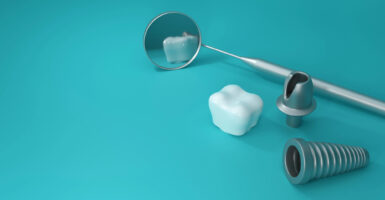
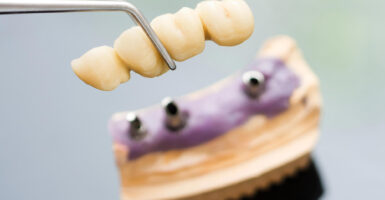
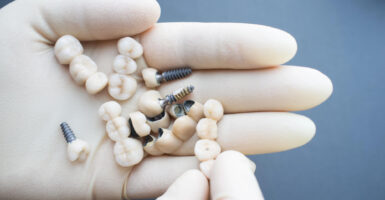
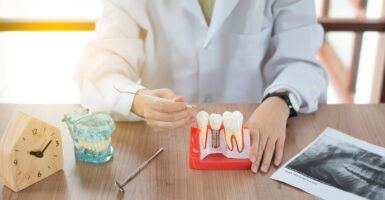
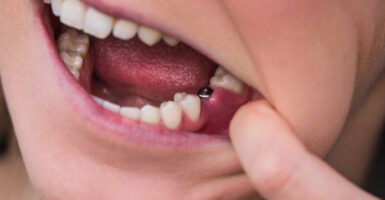
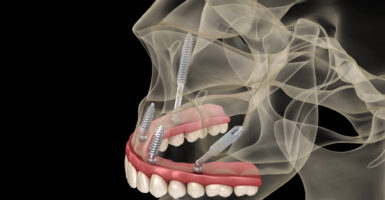
Reader Interactions